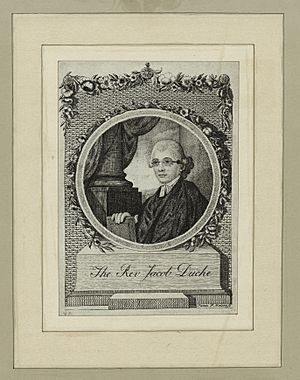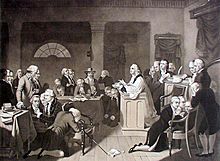Jacob Duché facts for kids
Quick facts for kids Jacob Duché |
|
| Born | 1737 in Philadelphia, Province of Pennsylvania |
|---|---|
| Died | 1798 (aged 60–61) in Philadelphia, Pennsylvania, U.S. |
| Church | Christ Church, Philadelphia |
| Title | Rector |
| Spouse |
Elizabeth Hopkinson
(m. 1759) |
| Parents | Jacob Duché Sr. (father) |
The Reverend Jacob Duché (1737–1798) was an important religious leader. He was a Rector (head priest) at Christ Church in Philadelphia, Pennsylvania. He also became the first chaplain for the Continental Congress.
Early Life and Education
Jacob Duché was born in Philadelphia in 1737. His father, Colonel Jacob Duché, Sr., later became the mayor of Philadelphia. His grandfather was Anthony Duché, a French Huguenot.
Jacob Duché went to the Philadelphia Academy. Then he joined the first class at the College of Philadelphia. This school is known today as the University of Pennsylvania. He also taught Greek and Latin there.
In 1757, he graduated as the best student in his class. He then studied briefly at Cambridge University. After that, he became an Anglican clergyman. He was ordained by the Bishop of London. Soon after, he returned to the American colonies.
In 1759, he married Elizabeth Hopkinson. She was the sister of Francis Hopkinson. Francis Hopkinson later signed the United States Declaration of Independence. In 1768, Duché was chosen to join the American Philosophical Society.
Chaplain to the Continental Congress
Duché first became known to the First Continental Congress in September 1774. He was asked to lead the opening prayers at Carpenters' Hall. On September 7, he read the 35th Psalm. Then he gave a powerful prayer without reading from a book.
O Lord our Heavenly Father, high and mighty King of kings, and Lord of lords, who dost from thy throne behold all the dwellers on earth and reignest with power supreme and uncontrolled over all the Kingdoms, Empires and Governments; look down in mercy, we beseech thee, on these our American States, who have fled to thee from the rod of the oppressor and thrown themselves on Thy gracious protection, desiring to be henceforth dependent only on Thee, to Thee have they appealed for the righteousness of their cause; to Thee do they now look up for that countenance and support, which Thou alone canst give; take them, therefore, Heavenly Father, under Thy nurturing care; give them wisdom in Council and valor in the field; defeat the malicious designs of our cruel adversaries; convince them of the unrighteousness of their Cause and if they persist in their sanguinary purposes, of own unerring justice, sounding in their hearts, constrain them to drop the weapons of war from their unnerved bands in the day of battle!
Be Thou present, O God of wisdom, and direct the councils of this honorable assembly; enable them to settle things on the best and surest foundation. That the scene of blood may be speedily closed; that order, harmony and peace may be effectually restored, and truth and justice, religion and piety, prevail and flourish amongst the people. Preserve the health of their bodies and vigor of their minds; shower down on them and the millions they here represent, such temporal blessings as Thou seest expedient for them in this world and crown them with everlasting glory in the world to come. All this we ask in the name and through the merits of Jesus Christ, Thy Son and our Savior. Amen.
This prayer deeply affected the delegates. John Adams wrote about it to his wife.
On July 4, 1776, the United States Declaration of Independence was approved. Duché met with his church leaders. They decided that the name of King George III would no longer be read in church prayers. Duché followed this decision. He crossed out those prayers from his Book of Common Prayer. This was a very serious and risky act for a clergyman. He had sworn loyalty to the King. On July 9, Congress officially chose him as their first chaplain.
Change of Loyalty and Later Life
In September 1777, the British army took control of Philadelphia. General William Howe arrested Duché. This showed how serious his actions against the King were. He was later released.
After his release, Duché supported the British side. He became a Loyalist and wrote messages for the British. He wrote a famous letter to General George Washington. Washington's army was at Valley Forge, Pennsylvania. In the letter, Duché asked Washington to stop fighting. He urged him to make peace with the British.
Suddenly, Duché went from being a hero for the American cause to an outcast. He was found guilty of acting against the new United States. His property was taken away. Because of this, Duché moved to England. There, he became a chaplain at an orphan asylum in Lambeth. He became known as a very good speaker.
Duché could not return to America until 1792. This was after he had a stroke. On October 1, 1777, Congress chose new chaplains. They were William White and George Duffield. William White took Duché's place at Christ Church. George Duffield was a pastor at the Third Presbyterian Church of Philadelphia.
Jacob Duché died in 1798 in Philadelphia. He is buried in St. Peter's churchyard.
His daughter, Elizabeth Sophia Duché, was born in Philadelphia in 1774. She died in Montréal in 1808. She married Captain John Henry in 1799. Henry was an army officer. He played a part in the United States declaring war on Great Britain in 1812.
 | Aaron Henry |
 | T. R. M. Howard |
 | Jesse Jackson |



